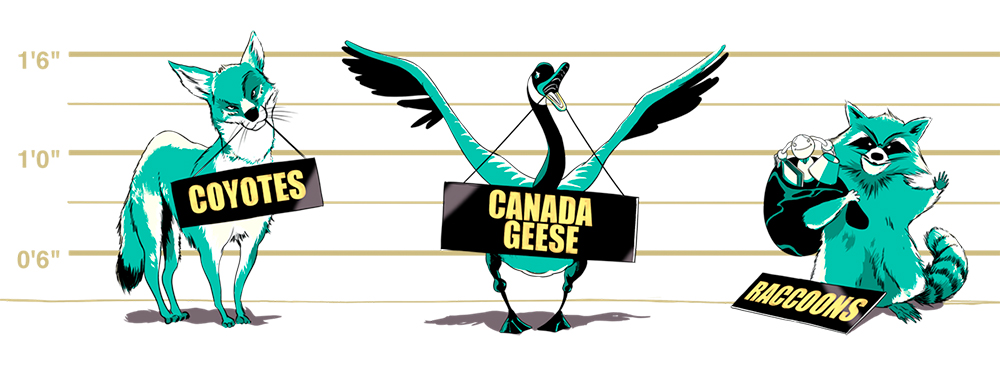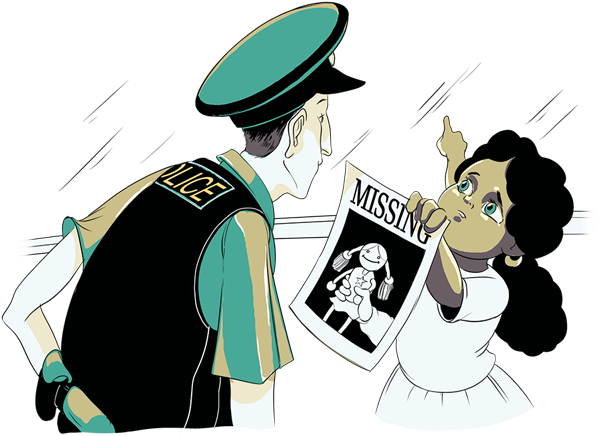Think the Canada geese and goslings living in your neighbourhood are cute? Think again, says Colleen Cassady St. Clair, '88 BSc(Spec), professor of biological sciences. When it comes to urban wildlife, St. Clair says we shouldn't assume it always provides ecological benefits. Some species are actually urban exploiters - such as Canada geese, coyotes and raccoons. "They're species that don't just adapt to urban areas, they actively exploit the resources in urban areas," St. Clair says. Doing your part to maintain ecological balance in cities means keeping the exploiters in check.
Coyotes
The Lowdown: Coyotes have spread across North America over the past 300 years, from Phoenix to Yellowknife, Vancouver to Halifax. As urban coyotes have become more abundant, they've also become more brazen.
Still Think They're Cute? There are increasing reports of conflicts between coyotes and humans, like a coyote attacking a toddler in Burnaby, B.C., in May. We're still learning about why coyotes are becoming bolder, says St. Clair, who is researching the topic.
How to Drive Away These Neighbours: Don't simply accept urban coyotes in residential areas. "It's better to act really aggressively," says St. Clair, who leads the Edmonton Urban Coyote Project. "Don't let it think it can just walk around your neighbourhood during the day. Chase it, throw things at it, yell at it."
Betcha Didn't Know: Compost and bird feeders can attract coyotes both directly and by way of the seed-eating rodents drawn to your yard. Keep compost in a bin and put a mesh basket under bird feeders to limit your rodent and coyote visitors.
Canada Geese
The Lowdown: At the beginning of the last century, Canada geese were in serious decline from over‑harvesting. "For decades, people had the mentality - and rightly so - that they needed protection," St. Clair says. But that's no longer the case.
Still Think They're Cute? Once seen as icons of wilderness, Canada geese are an increasing ecological and social problem in cities around the world, attacking people, soiling parks and colliding with aircraft. In recent years, one bold fellow on North Campus even got the nickname, and Twitter handle, Quad Goose.
How to Drive Away These Neighbours: These picky neighbours are looking for a particular habitat. Their preference? Mowed lawn (so they can easily see predators) near water. Cities can change that habitat by, for example, letting cattails grow up around the edge of the pond, prompting Canada geese to move on.
Betcha Didn't Know: Stormwater lakes (also called storm ponds) provide many environmental benefits in cities. But some also inadvertently provide ideal habitat for Canada geese, as the birds can easily lead goslings into the water while watching for predators.
Raccoons
The Lowdown: Raccoons are common in many North American cities and have even been spotted in Edmonton, St. Clair says. They aren't overwintering yet, but she adds that could change soon because of climate change.
Still Think They're Cute? "Most people who encounter raccoons, and I must admit I'm guilty, find them so appealing," St. Clair gushes … er, says. "They're these cute little bandits." But don't be deceived! Raccoons can tear their way into your garbage or even your attic, and they carry nasty diseases and parasites.
How to Drive Away These Neighbours: There's a reason raccoons are called trash pandas, so raccoon-proof bins are essential. Cities that are currently without raccoons should start preparing now for the inevitable, including educating citizens.
Betcha Didn't Know: Raccoons will test our mettle, St. Clair says, because they are so adorable. "We should not welcome raccoons with open arms, or we will regret it later."
You can contribute to the Edmonton Urban Coyote Project by reporting area coyote sightings.


We at New Trail welcome your comments. Robust debate and criticism are encouraged, provided it is respectful. We reserve the right to reject comments, images or links that attack ethnicity, nationality, religion, gender or sexual orientation; that include offensive language, threats, spam; are fraudulent or defamatory; infringe on copyright or trademarks; and that just generally aren’t very nice. Discussion is monitored and violation of these guidelines will result in comments being disabled.